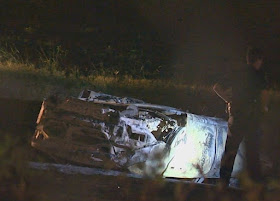Traffic Experts: July 4 Is Deadliest Day On America's Roads; Holiday Weekend Raises Risk
Don Stacom
July 4 Is Deadliest Day On America's Roads
TOMORROW
HARTFORD — The mix of heavy traffic, hot weather and a generally festive mood contribute to making the July Fourth weekend particularly hazardous to drivers, according to experts.
July 4 itself has become the deadliest day of the year on American highways, and is a particularly serious risk for motorcyclists, according to the Insurance Institute for Highway Safety.
Alcohol plays a prominent role, according to a newly released report from the institute: New Year's Day is the only day of the year with more alcohol-related fatal wrecks.
"The deadliest times on the road are July 4 and Jan. 1, and it's no coincidence that both are tied to heavy drinking," said Chris Hayes, a vice president in the risk control operation at Travelers.
"There's so much attention now to distracted driving and cell phone use, but we need to remember the basics, too: Be on the lookout, wear your seat belt and don't drink and drive," Hayes said in an interview at Travelers' downtown office.
State troopers will deploy extra patrols to catch intoxicated or reckless drivers during the weekend.
"Please do not drink and drive since that is a deadly combination," Col. Alaric Fox said in a statement. "If you are on the road and suspect a drunk driver, please call 911, as this is a true emergency."
On a typical day, about one third of fatal accidents are linked to alcohol; on July 4, that rises to nearly half, the insurance institute reports.
Overall, an average of 118 people have died on the roads on each Independence Day between 2010 and 2014, according to the insurance institute report. That compares to 90 on a typical day of the year. The statistics on motorcyclists are even more sobering: Independence Day has by far the highest death toll for riders, claiming an average of 26 lives compared to just over 12 on a typical day.
State troopers will be out in increased numbers this July 4 weekend in the hopes of preventing accidents.
Connecticut had just two fatalities during last year's holiday weekend, but troopers reported 170 crashes — 48 of them with injuries — and wrote almost 860 speeding tickets. They charged 33 motorists with drunken driving.
This year shapes up as a busy one on the roads. AAA is projecting that almost 36 million Americans will be driving between June 30 and July 4, up more than 1 percent from the 2015 Independence Day holiday period.
"July 4 is Monday, allowing for extra time for beach outings, cookouts and fireworks. This translates to increased traffic starting as early as Friday and continuing through the evening of July 4," state police said.
Hayes counsels motorists to take precautions because of the extra hazards. Summertime sun and heat can lead to dehydration, and extended daylight hours can lead some to stay awake longer than they're accustomed to, he said. Traffic jams are likely, and delays for highway construction cause more frustrating backups.
"You're trying to squeeze 36 million people into fewer lanes, and a lot of them are going to places they're not usually seeing — the beach, a family outing, a picnic," Hayes said.
Hayes advises anyone driving to avoid alcohol altogether, and to be particularly wary of fatigue. Motorists entering work zones or stop-and-go traffic jams should eliminate distractions such as the radio, and focus on leaving plenty of stopping room between their car and the vehicle ahead.
"We all want to get to our destinations," he said. "If you play it in an aggressive way, you increase everyone's risk."









